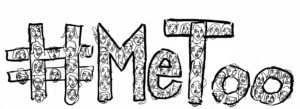In response to the sexual assault scandal of Harvey Weinstein, a major figure in Hollywood, actress Alyssa Milano tweeted, “If you’ve been sexually harassed or assaulted write ‘me too’ as a reply to this tweet.” The hashtag #MeToo has been all over social media ever since. According to the New York Times, the hashtag was used “over 12 million times on Facebook in the first 24 hours alone.” The “Me Too” campaign is meant to give people a sense of the magnitude of the problem of sexual assault and harassment.
This movement was actually initiated 10 years ago by an African-American woman named Tarana Burke, who explains in her own words on the website metoo.support that she wanted “Me Too” to be a catchphrase to be shared between survivors of assault. She intended the catchphrase to promote healing and empowerment of those affected, with a focus on women of colour.
In contrast, the recent hashtag focuses on raising awareness. The visibility, awareness and solidarity that has been fostered demonstrates the incredible power that social media has in mobilizing people on vital issues. However, the campaign places pressure on the victims of sexual assault and harassment to expose their wounds and reveal traumatic experiences for people to believe them and take the issue seriously.
While many women struggle to come to terms with being survivors of sexual violence and aggression, an even bigger problem is that men have trouble considering themselves (or their friends) the aggressors. In the current “Me Too” campaign, the victim must take centre stage while the aggressor is able to remain hidden from sight. Still, it is important not to discount the bravery of the individuals who have shared “Me Too” posts in an effort to raise awareness of the extent that sexual assault and harassment affects people. I don’t condone the silencing of victims. This movement empowers individuals who have been sexually harassed or assaulted to come to terms with their experiences, to remove the stigma of being victims, to build solidarity with other affected individuals and to take a stand. However, it is extremely telling that when I saw women I knew post “#MeToo” I was never surprised. I don’t think I know a woman who has never been sexually harassed or assaulted in one way or another.
For men, understanding the magnitude of the problem is an important first step, but there is a lot more work that needs to be done in addressing the root causes. Our society needs to stop systemically suppressing victims of sexual assault and harassment. In the end, by compelling victims to reveal their pain, we place an undue responsibility on victims to solve the problem. While it’s easy to imagine these aggressors as obvious villains, often they are a classmate sitting across from you, a friendly face at the bar or even a friend. Maybe if we can place the focus on the aggressors and those who are complicit in protecting them, we can make a real change. It shouldn’t be our job to display our trauma to you.






